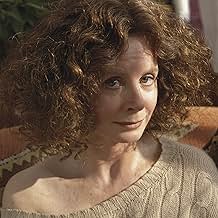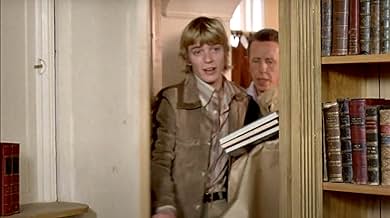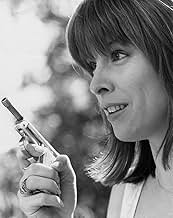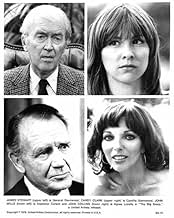Philip Marlowe es un ojo privado, quien se involucra en un peligroso caso de asesinato y chantaje.Philip Marlowe es un ojo privado, quien se involucra en un peligroso caso de asesinato y chantaje.Philip Marlowe es un ojo privado, quien se involucra en un peligroso caso de asesinato y chantaje.
- Dirección
- Guión
- Reparto principal
- Karl Lundgren
- (as Simon Turner)
Reseñas destacadas
That's where the 1978 version excels - and fails. Let's start with the fails. In the original, the scenes in the bookshops near the beginning rule with Bogie's use of humour and the electric suggested tryst with Dorothy Malone's character. Sometimes the suggestion can be erotic enough. Perhaps that's why this version skips the fun and the implied sex for another more mundane approach.
The other fail is the atmosphere. This version lacks any. The original's shadows and textures evoked each scene and created moods. This version lacks any specific mood to instead tell a story in almost a heightened reality. The direction does the same, relying on straight-ahead narrative more like a TV movie than a theatrical film.
There's so much more here that succeeds. Despite his age, Mitchum is a fine Marlow, more cynical and world-weary than Bogart's version. The script is sharp, full of humour and wry observations. The biggest improvement is the depiction of sex. Freed of the tyranny of the forties' censorship, scenes like Carmen naked and stoned are much more realistic and make a more satisfying treatment, even if the innuendo is not as predominant.
OK, it's not the classic it could've been. It's still a decent flick to rent or watch on cable. Marlowe is solid, Candy Clark is wonderfully loony, Joan Collins is pure kitsch, Richard Boone plays the essence of evil. It's good to see James Stewart, even if his gentle disposition doesn't quite match the demeanour of a General. The supporting cast are almost uniformly intriguing and fun to watch. And what a cast!
The Big Sleep may be no masterpiece but it is great fun. Relax your expectations and enjoy it for what is - fine entertainment.
In addition, Chandler's convoluted plot (originally derived from two or three separate short stories) didn't offer an easy screen translation, even before all the "juicy parts" were excised.
So this must have seemed like a great idea. Robert Mitchum had successfully played Philip Marlowe a few years earlier in "Farewell, My Lovely", and the MPAA ratings system meant that they could be as explicit as they wanted; the filmmakers could be more faithful to Chandler's novel *and* show us Candy Clark nude! How could we go wrong?
In lots of ways, unfortunately. First up, Mitchum didn't seem to fit the role of Marlowe nearly as well in this movie as he did in "Farewell, My Lovely". This makes me suspect that the earlier story was more deftly tailored to Mitchum's age and acting style, with lots of references to how old and tired Marlowe feels. In this case, the script sticks very closely -- basically scene-by-scene, almost line-by-line -- to the original novel, but Mitchum doesn't fit the part as well, somehow. In the book, Marlowe was very much "in your face", giving a hard time to everyone from the cops to Eddie Mars to the Sternwood girls. That means that in this movie, Mitchum's nonchalant style doesn't fit with many of the scenes he has to play. Bogart was "nonchalant" too, I guess, but in a different way. Bogie's tough guys would feign casualness, but they always seemed like they were waiting for the other guy to start something, and when Bogart dug in and got to work, he took it seriously. Mitchum just seems like he couldn't care less one way or the other. It doesn't work for this story, where the second half is driven by Marlowe's desire to find out the truth even when he isn't being paid to do so.
The move from L.A. to London didn't bother me at all. It made an interesting, coincidental "bridge" between the classic films noir and more recent movies about London gangs like "Snatch".
But the deepest problem with this film is that while it follows the externals of Chandler's novel much more closely in terms of the plot and (most of) the dialogue, it fails utterly to capture the real heart and soul of the novel. Of course, the earlier movie version did, too -- this novel may well be unfilmable -- but at least it had Bogie and Bacall. This one has Mitchum and Miles. And Candy Clark nude. And not much else.
Take a look at the beginning of the movie. The second scene, where Marlowe visits General Sternwood in the greenhouse, is probably one of the classics of 20th century popular literature. Few other novels begin with a scene which so completely evoke their characters, and atmosphere, as Marlowe sweats, gags on the scent of orchids, and converses with a tired, bitter, old, rich man clinging to his miserable life. Chandler is hitting you hard with every trick in his bag, and his timing, dialogue and characterization are flawless. Howard Hawks' screenwriters were smart enough to leave much of his original dialogue in this scene. By contrast, in the Mitchum film, scene after scene features lines taken verbatim from the novel, but for some reason, they chose to leave out some of the best: "How do you like your brandy, sir?" "Any way at all." or the all-time classic, "A nice state of affairs when a man has to indulge his vices by proxy". If the screenwriters chose to leave in lines about Pekineses and loogans, how could they possibly leave these ones out?
Maybe they thought that such lines wouldn't sound right coming out of James Stewart -- they were probably right -- but that just shows what an inept choice he was for this part. General Sternwood is supposed to be incredibly bitter, yet we're given a typical Stewart performance; he almost looks perky, certainly not broken by life. He looks physically weak but hardly seems cynical or jaded enough to have produced two such screwed-up daughters. It wasn't even made clear why he was sitting out in the greenhouse, and Marlowe doesn't seem particularly uncomfortable while he's out there (although a later reference to Rusty Regan "sweating like a pig" is left in). It's just a mess, and does nothing at all to set us up for what follows.
To cite one further example, another key scene manages to miss the point completely while still following Chandler's plot closely. The scene where Harry Jones finally approaches Marlowe in Marlowe's office is the turning point of the entire novel. The case is closed, Marlowe is literally signing the check to deposit it, and Jones walks in with the exact piece of information Marlowe's been missing the entire time. Like so many scenes in the novel, this one is simply brilliant, overflowing with great dialogue ("She's too big for you"), and in some ways tying together the entire story. Yet after following most of the scene very closely, the script inexplicably stops short of some of Chandler's best writing:
"'This Regan was a cockeyed sort of buzzard. He had long-range eyes. He was looking over into the next valley all the time. He wasn't scarcely around where he was. I don't think he gave a damn about dough. And coming from me, brother, that's a compliment.'
"The little man wasn't so dumb after all. A three for a quarter grifter wouldn't even think such thoughts, much less know how to express them."
The filmmakers may have closely followed the plot of the original novel in this version, but the fact that they could leave out writing like this, while clinging almost religiously to most of the rest of the book, shows that they couldn't have been more clueless about the real "core" of Chandler's writing. Alas, it appears that we are still waiting for the definitive movie version; this one manages to reduce "The Big Sleep" to a barely-above-average TV movie-of-the-week with Candy Clark, nude.
Winner treats this material with quite a bit of humor, rendering it positively silly on a frequent basis. It makes one believe that he had contempt for it. But Chandlers' story is fortunately still engrossing, and it's the kind of thing that really keeps viewers on their toes, trying to pay attention to all the details and twists. (Since there's much exposition to digest, viewers can't afford to let their attention wander.) The film *looks* absolutely great, with fine use of locations and lovely photography. It's spiced up with some (tastefully done) nudity, but it's never ever very violent.
The main draw is a sterling group of American and British actors. Sarah Miles, Richard Boone, Joan Collins, Edward Fox, John Mills, Oliver Reed (typically amusing as a threatening gangster / casino owner), Harry Andrews, Colin Blakely, Richard Todd, Diana Quick, and James Donald are all present and accounted for. Mitchum anchors the proceedings with his colorful performance, but dragging things down quite a bit is the way overdone airhead shtick by Candy Clark, playing Sternwoods' younger daughter. Usually she's pretty reliable, but here she's much too annoying. Mitchum and company do have fun with the sometimes witty and lively dialogue.
Well paced, and fairly energetic, but overall not especially memorable. Some people might want to just revisit the Bogie and Bacall version instead.
Six out of 10.
For one reason or another, Michael Winner has decided to move things over to England; although the lead man remains American. This change in location has not really had an effect on the story; but it did leave Winner free to recruit an excellent roster of British stars. Among the names in the cast list are Oliver Reed, John Mills, Joan Collins, Richard Boone and Edward Fox. The film is lead by Robert Mitchum, who while not as great as Humphrey Bogart, still makes an excellent leading man and there's also enough room in the cast for an aging James Stewart. The film is a lot shorter than the earlier version of this story and Winner has really trimmed things down a lot, which means that the story is much more straight forward than it was in the 1946 film. This is not really a bad thing as it does mean that the film is easier to follow; although it also seems less expansive. The characters take something of a backseat too, with only the lead character getting any real development. Still, this is at least an entertaining thriller and I don't feel like I wasted my time watching it; although Howard Hawks' version is better.
¿Sabías que...?
- CuriosidadesJames Stewart had difficulty saying his lines on time due to hearing and possibly memory problems. Some of the cast were shocked by his aged appearance. Robert Mitchum recalled, "The picture was all about corpses, but Jimmy looked deader than any of them." Stewart actually outlived Mitchum by one day, nearly 20 years later.
- PifiasWhen Marlowe takes the gun from Camilla after she unloads it on him with multiple blank rounds, he grabs the barrel with his bare hands. That should have proved to be very painful as the barrel would be extremely hot.
EDIT: This is incorrect. Blank cartridges in a small calibre gun will not heat the barrel to any great extent. A gun barrel gets hot mainly due to the friction of the bullet going through the barrel, not from the powder in the cartridge.
- Citas
Charlotte Sternwood: [when Marlowe declines to blackmail her] Wha-? You don't want money?
Philip Marlowe: Oh sure. All I itch for is money. I'm so greedy that for fifty pounds a day plus expenses on the day I work, I risk my future, the hatred of the cops, of Eddie Mars and his pals, I dodge bullets and put up with slaps and say "Thank you very much. If you have any further trouble please call me: I'll just put my card here on the table." I do all that for a few pounds. And maybe just a little bit to protect what little pride a sick and broken old man has in his family, so that he can believe his blood is not poisoned. That his little girls - though they may be a trifle wild - are not perverts and killers.
- ConexionesFeatured in James Stewart, Robert Mitchum: The Two Faces of America (2017)
Selecciones populares
- How long is The Big Sleep?Con tecnología de Alexa
- After reading the book three times and watching both versions of the film innumerable times, who killed owen taylor?
Detalles
- Fecha de lanzamiento
- Países de origen
- Idioma
- Títulos en diferentes países
- The Big Sleep
- Localizaciones del rodaje
- Knebworth House, Knebworth, Hertfordshire, Inglaterra, Reino Unido(Sternwood Mansion)
- Empresas productoras
- Ver más compañías en los créditos en IMDbPro
Taquilla
- Presupuesto
- 3.000.000 GBP (estimación)
Contribuir a esta página






































